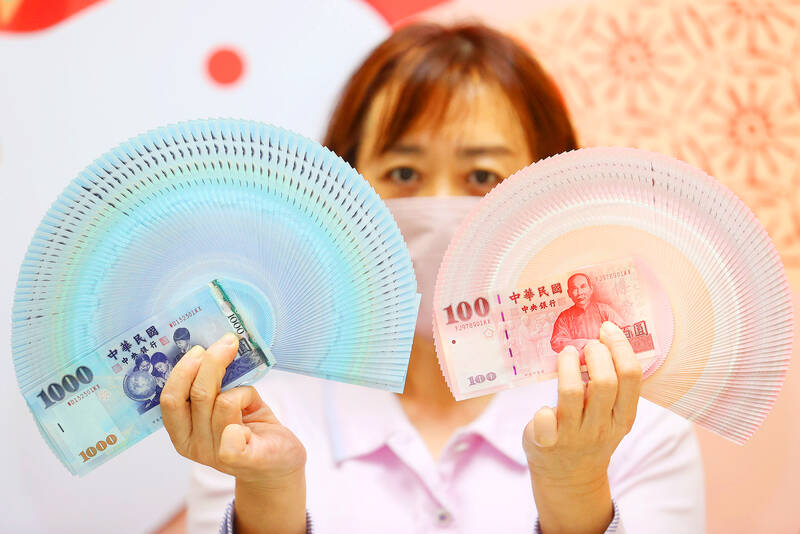The New Taiwan dollar dropped more than 8 percent against the US dollar in the Year of the Tiger, the steepest annual decline in 25 years, with the greenback bolstered by aggressive interest rate hikes made by the US Federal Reserve.
The NT dollar closed at NT$30.368 against the US dollar on Thursday, the last trading session before the Lunar New Year holiday, down NT$2.54, or 8.36 percent, for the lunar calendar year.
Beginning in 2019, the NT dollar appreciated in value for three consecutive years as it benefited from the US-China trade war, quantitative easing policies during the COVID-19 pandemic and robust domestic stock market growth.

Photo: CNA
It closed out the previous lunar year, the Year of the Ox, at NT$27.828 against the US dollar.
However, the Year of the Tiger brought a sharply different set of circumstances, with Russia’s invasion of Ukraine, rising inflation and the US Fed raising interest rates by a cumulative 425 base points.
As the US dollar soared, the NT dollar — facing pressure from declining exports — sank from NT$27 to a low of NT$32 against the greenback in a “rarely seen” margin of decline, a foreign exchange industry source told CNA.
Only when the Fed began signaling late last year that it would slow the rapid pace of interest rate increases, causing the US dollar to drop, was the NT dollar able to rebound slightly, the person said.
Looking ahead to the Year of the Rabbit, the US is likely to end its rate hikes, and possibly even lower rates at the end of this year, which would improve the NT dollar’s prospects of regaining some of the value it lost in the Year of the Tiger, the source said.
While falling US inflation has fanned speculation that the Fed would further slow its pace of interest rate hikes, several top US central bank officials have said more still needs to be done before they are satisfied prices are under control.
US Fed Vice Chair Lael Brainard on Thursday said policymakers would “stay the course” in lifting rates.
“Even with the recent moderation, inflation remains high and policy will need to be sufficiently restrictive for some time,” Brainard told an event in Chicago, adding that it would ensure inflation returns to 2 percent on a sustained basis.
At a separate event on Thursday, New York Fed President John Williams said inflation remained too high, and that bringing down prices would likely require a “period of below-trend growth and some softening of labor market conditions.”
While the Fed has taken strong action, “it is clear that monetary policy still has more work to do,” he said, adding that policy affects parts of the economy differently.

SEASONAL WEAKNESS: The combined revenue of the top 10 foundries fell 5.4%, but rush orders and China’s subsidies partially offset slowing demand Taiwan Semiconductor Manufacturing Co (TSMC, 台積電) further solidified its dominance in the global wafer foundry business in the first quarter of this year, remaining far ahead of its closest rival, Samsung Electronics Co, TrendForce Corp (集邦科技) said yesterday. TSMC posted US$25.52 billion in sales in the January-to-March period, down 5 percent from the previous quarter, but its market share rose from 67.1 percent the previous quarter to 67.6 percent, TrendForce said in a report. While smartphone-related wafer shipments declined in the first quarter due to seasonal factors, solid demand for artificial intelligence (AI) and high-performance computing (HPC) devices and urgent TV-related orders

Taiwan Semiconductor Manufacturing Co (TSMC, 台積電) and the University of Tokyo (UTokyo) yesterday announced the launch of the TSMC-UTokyo Lab to promote advanced semiconductor research, education and talent development. The lab is TSMC’s first laboratory collaboration with a university outside Taiwan, the company said in a statement. The lab would leverage “the extensive knowledge, experience, and creativity” of both institutions, the company said. It is located in the Asano Section of UTokyo’s Hongo, Tokyo, campus and would be managed by UTokyo faculty, guided by directors from UTokyo and TSMC, the company said. TSMC began working with UTokyo in 2019, resulting in 21 research projects,

Quanta Computer Inc (廣達) chairman Barry Lam (林百里) yesterday expressed a downbeat view about the prospects of humanoid robots, given high manufacturing costs and a lack of target customers. Despite rising demand and high expectations for humanoid robots, high research-and-development costs and uncertain profitability remain major concerns, Lam told reporters following the company’s annual shareholders’ meeting in Taoyuan. “Since it seems a bit unworthy to use such high-cost robots to do household chores, I believe robots designed for specific purposes would be more valuable and present a better business opportunity,” Lam said Instead of investing in humanoid robots, Quanta has opted to invest

EXPANSION: While Gigabyte Technology is optimistic about market demand this year, uncertainty remains due to the impact of potential US tariffs and currency fluctuations Motherboard and graphics card maker Gigabyte Technology Co (技嘉) yesterday said that it plans to launch an artificial intelligence (AI) server assembly line in the US in the second half of this year. The company’s core motherboard and graphics card businesses in the US remain stable, but sales of its higher-priced AI servers still hinge on the development of tariff policies, Gigabyte chairman Dandy Yeh (葉培城) told reporters following the company’s annual shareholders’ meeting in Taipei. Yeh was referring to the “reciprocal” tariffs announced by US President Donald Trump on April 2, which were later postponed for 90 days. While Gigabyte